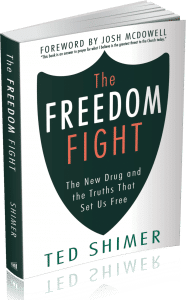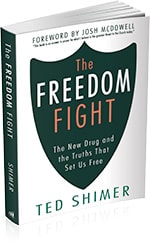This series is exploring the Roots of Addiction laid out in the book of Ephesians. You can start at the beginning here or watch Freedom Fight founder, Ted Shimer, as he provides the important context of our identity in Christ as a foundation for understanding the Roots to Addiction to help you beat porn addiction.
The Root: Negative Emotions.
The Solution: Process emotions.
Be angry, and yet do not sin; do not let the sun go down on your anger, and do not give the devil an opportunity.
– Ephesians 4:26, 27
This verse is talking about dealing with your anger but the principle applies to any negative emotion. Most people don’t realize they have emotional triggers they have learned to medicate with porn. Addiction experts tell us that when someone uses their addictive substance to numb negative emotions that is when the addiction goes deep. Growing in self-awareness and learning to process emotions with God and others will help them see a relapse coming instead of being blindsided by it.
Negative emotions are similar to the check engine light in a car that informs the driver when something needs attention.
Ignoring the check engine light will most likely lead to bigger issues later. Left unchecked, these negative feelings can “give the devil an opportunity” by leading us to medicate our emotions instead of processing them with the Lord and others.
Negative emotions are a significant root of porn addiction that must be addressed for freedom to be realized. Overcoming porn involves growing in self-awareness and learning to process feelings instead of medicating them. Acting out gives a person the jolt of dopamine they crave. Pornography- which can produce up to 10 times more dopamine than relational sex- provides a powerful, albeit temporary, solution that takes away the discomfort.
It takes time and practice to develop self-awareness.
The wisdom of the prudent is to give thought to their ways.
Proverbs 14:8
A relapse doesn’t just happen. Someone who has good self-awareness of how spiritual, emotional and lifestyle dynamics influence their behavior can learn to recognize they are moving toward acting out before it is too late.
Know Your Emotions.
Identifying emotions is the first step to processing them instead of allowing the slide toward relapse to continue. Each letter of the BLASSTED acronym represents common negative feelings that trigger people to reach for their drug of choice:
- Bored
- Lonely
- Anxious
- Stressed
- Self-doubting
- Ticked-off
- Exhausted
- Depressed
Porn users use sexual behavior to medicate their negative feelings, and the more unaware a person is of their feelings, the more power their emotions have over them.
These negative emotions increase cravings and will either be medicated or be processed in a healthy way.
Process emotions. Don’t medicate them.
Escaping the pain of negative emotions is not the goal, freedom is. True freedom comes when we learn healthy ways to process and cope with pain, not new ways to ignore or medicate it.
King David, the author of many Psalms in the Bible, illustrates what it can look like to experience and express the full range of positive and negative feelings. He confessed his sin, described his depression, expressed his loneliness and declared his joy.
Search me, O God, and know my heart; try me and know my anxious thoughts; and see if there be any hurtful way in me, and lead me in the everlasting way
– Psalm 139:23-24
How to Effectively Process Your Emotions.
-
Identify the Emotion.
The first step a person should take in processing emotions is to identify the emotion. In the above example from the Psalms, David identified his negative feeling as anxiety.
When people use BLASSTED to regularly evaluate their emotions, it can help them start identifying their feelings more easily. Once their emotions are identified, people can take the next step.
-
Determine the Source of the Emotion.
When David was not clear about the source of his emotions, he asked for help. He asked God to help him determine if his anxiety was connected to something harmful within him. He prayed, “See if there is any hurtful way in me” (Psalm 139:23). We can do the same.
Sometimes negative feelings are connected to deeper issues that may lead to hurtful ways in us. Our fear, depression, or anxiety might be related to identity struggles, shame issues, or trauma. When someone medicates their pain instead of examining the root cause of the negative feelings, they don’t address the real issues. In this way, they trust their own coping mechanisms instead of trusting God for deeper healing.
-
Cast Your Cares on the Lord.
We are not meant to handle our pain alone. God invites us to come to Him with our cares, burdens, and issues.
Cast your cares on the Lord and he will sustain you.
– Psalm 55:22
We are commanded to cast, not carry, our cares. When we do this, God promises to sustain us. What could keep us from casting our cares on the Lord? Pride seems to be a major issue. Peter quotes the command to “cast your cares” on the Lord immediately after his exhortation to “humble yourselves under the mighty hand of God, that He may exalt you at the proper time” (1 Peter 5:6). It’s the prideful person who medicates his emotions instead of humbling himself and casting his worries on the Lord. God desires to carry our burdens.
-
Anticipate Your Emotions.
It takes emotional intelligence for someone to be able to anticipate their feelings.
- What are your emotional triggers?
- What situations or people set you up for negative emotions?
- When do you feel most vulnerable to pain or difficult emotions?
A couple of common triggers we see include self-doubt and boredom (particularly in younger, single people). Planning for these triggers might include contacting an accountability partner before a meeting certain to create self-doubt or planning activities such as reading a book, hiling, exercising or gathering with friends in order to hold off periods of boredom in healthy ways.
-
Be Aware of Depleting Your Emotional Tank.
Those who are self-aware know the things which deplete and refill their emotional tank. Emotional exhaustion brings people to a place where relapse feels inevitable. In the world of sex addiction, “craziness” refers to an out-of-control lifestyle. This state occurs when a person feels overwhelmed, out of balance, or has a loss of control.
A person must identify the basic routines that, if missed, indicate they are moving toward craziness. These core routines could be a person’s spiritual disciplines, exercise routines, sleep or recovery group practices. When things start getting crazy, these are the first routines to go.
People who are unaware of their emotions regularly head into craziness. The craziness of an unbalanced lifestyle will eventually lead to relapse. When a person is aware of what a balanced lifestyle is for them, they can build routines that keep their emotional tank full.
-
Regularly Process Your Emotions With Others.
Evaluating emotions is helpful, but communicating that evaluation takes the processing of emotions to a deeper level. This is why regular check-ins with accountability are crucial. The most successful recovery groups have daily check-ins as a foundational practice. The process of check-ins must be easy enough to do regularly which is one reason we built our Freedom Fight app.
To beat porn addiction, a person must do hard emotional work.
Growing in emotional intelligence and self-awareness allows one to find a freedom through deeper relationships with God and others.
Looking for more resources to beat porn addiction?
1. Do you have a porn addiction? Take the Sexual Addiction Screening Test.
2. Take Action. Join the free 30-day challenge – a powerful biblically based and scientifically informed program to help you beat porn addiction – click here to join.
3. The ROOTS blogs (Roots, #1, #2, #3, #4, #5, #6) are all content summarized from a more thorough and detailed account found in the The Freedom Fight book. You can go buy it here if you need more details and help.

